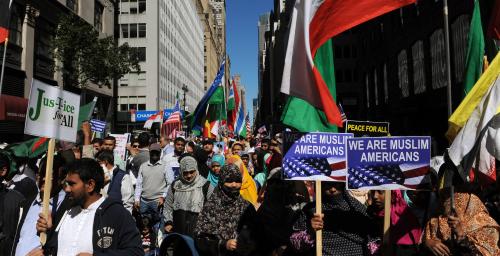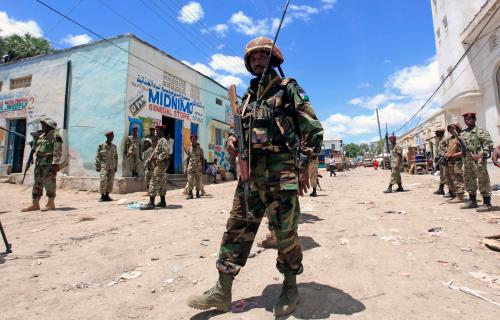A Brookings panel of experts debated whether the Supreme Court’s June 28 decisions regarding executive wartime powers was a rebuke or affirmation of the Bush administration’s legal strategy for fighting terrorism.
In three separate decisions, the Court declared that the executive branch cannot deny accused al Qaeda and Taliban members their liberties without a proper court hearing. In addition, the Court said that the nearly 600 detainees at the U.S. naval base in Guantanamo Bay, Cuba, can ask a judge to be released. Although the Court did uphold the president’s authority to detain a U.S. citizen as an “enemy combatant,” it took issue with the Bush administration’s interpretation of that authority.
Following the Court’s ruling, pundits and legal analysts differed on how to interpret the decision. Some see the ruling as a triumph of the law and civil liberties over the Bush administration’s claim to broad wartime authority. Others, however, cite the Court’s support for holding enemy combatants as a validation of the president’s strong stance on defeating terrorism.
At the Brookings forum, Neal K. Katyal, a professor at the Georgetown Law Center, and a former national security advisor to the deputy attorney general during the Clinton administration, said that the ruling was a “stinging” and “utter repudiation” of the Bush administration’s “aggressive” and “dubious constitutional claims.”
However, Baker and Hostetler Attorney David B. Rivkin, Jr., called Katyal’s interpretation “ludicrous.”
“The administration did better than 50 percent here,” said Rivkin, a former official at the White House and Departments of Justice and Energy during the Reagan and first Bush administration. “The Court’s bark is far worse than its bite in terms of what it actually did. The court firmly supported the concept of a wartime paradigm that the administration chose after September 11th.”
However, Katyal quickly responded, saying that such triumphant claims based on the Court’s ruling on enemy combatants were “mundane,” given that few would deny the executive branch such authority.
“Some of the administration’s defenders hope that if they can hide all these extreme propositions and say ‘we got a victory on this one point,’ then we’ll forget about these extreme claims,” Katyal said. “We may not realize how important June 28 was because we forgot how extreme the positions of the Bush administration were.”
Brookings Nonresident Senior Fellow and National Journal columnist Stuart Taylor, Jr. said that the rulings clearly were a rebuff of the Bush administration’s policies since only one justice—Clarence Thomas—sided with Bush in all three cases.
Putting aside debate over the decision’s benefactors, panelists discussed how the rulings would affect homeland security.
“The country is actually weaker today than it was before,” Katyal said. “The administration had some strong arguments about the detention power in their positions in the Guantanamo cases, but by taking this laundry list that says the government can do whatever it wants, when it wants, the Court was almost forced into repudiating what the government said. Future presidents are going to inherit a regime in which the executives hands are much more tied.”
“This was the right decision, and does not weaken the presidency,” replied Morton H. Halerpin, director of the Open Society Policy Center and a former State Department official during the Clinton administration. “This simply says that this is a nation of laws. It acted this way because it was confronted with an extraordinary claim: The president can sit in his office and make up a category—enemy combatants, in this case—then decide what the definition of that is, keep that secret, then write himself a note that a particular American citizen on the soil of the U.S. fits that secret definition, order the military to seize that person, put them in a military prison and not allow that person access to counsel or writ of habeas corpus or to the courts, and can hold that person as long as they want under those conditions.”
Brookings Senior Fellow Larry D. Thompson said the ruling could make fighting terrorism more difficult. “We’re dealing with a new kind of war with a new kind of enemy and the court completely failed to give the executive any kind of direction with respect to, what I believe is, the most important aspect of the war on terror: What do we do? And how does the government go about trying to prevent future attacks?” Thompson served as deputy attorney general from 2001 until 2003.
Thompson said that strong executive authority was needed in order to prevent “ticking time-bombs.”
“The criminal justice system is clearly inadequate to deal with a person who is ready to blow us up and who we need to get information out of,” Thompson said. “We may need to take a person and interrogate them without a lawyer? We must be able to detain and question al Qaeda operative in order to gain info with respect to how to prevent future attacks.”


Commentary
Op-edEvent Summary: Executive Power and Due Process: Supreme Court Rules on “”Enemy Combatants””
July 8, 2004